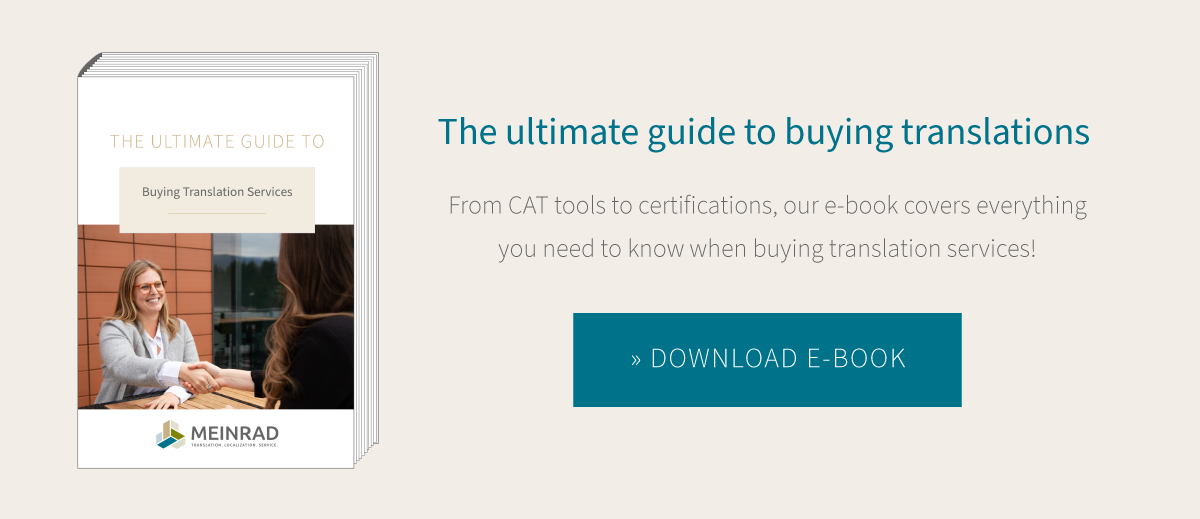
Buying translation services from multiple providers can lead to chaos and won’t give you the best value for money. MEINRAD explains why, and outlines the drawbacks and risks of a decentralized approach.
If you take a decentralized approach, the individual departments or project teams at your business responsible for each translation will get quotes from multiple translation agencies. Once you’ve got all of them, you need to compare the quotes – and that often isn’t easy, given that there are different ways of calculating prices and varying service levels. Either way, the cheapest provider will usually get the job at the end of the day. There are several drawbacks to this approach that you should weigh up carefully.
High ongoing workload
It’s pretty obvious that constantly getting quotes is a time-consuming process. Your staff will have to contact the various translation agencies, send all of them your files, and wait for them to get back to you with their quotes. Then you’ll spend time comparing the quotes. Don’t underestimate the amount of work involved here – and it’s a particular problem if you have urgent translations, as crucial time is wasted waiting for quotes and comparing them when they arrive.
Scattered translation memories and term bases
Resources like term bases and translation memories (TMs) play a key role in the modern translation process. TMs in particular are invaluable. If you have ten different translation service providers (each with their own TMs) and you send one translation to one provider and the next translation to another, lots of text will end up being translated two or three times – and you’ll pay for it two or three times too. That’s because each translation agency only has access to its own TMs and won’t know what the other agencies are doing. so your translations will be an inconsistent mess. You’ll only be able to save money with future translations if you know who translated which texts.
One option is to manage your own TMs, if the agencies are happy to give you access to them without a corresponding contractual agreement and are happy to use these “external translations”. But that creates lots of work for you in terms of updating the TMs and sending them back and forth between the individual agencies.
Inconsistent translations and style
This TM dilemma doesn’t just increase your costs as a result of paying twice for translations: working with different translation agencies also hugely increases the risk of inconsistent translations. As mentioned above, each agency only has access to its own TMs, so the translator at agency A has no way of knowing that the translator at agency B might have already translated a particular sentence. It’s likely they’ll translate the sentence slightly differently, or they might even come up with a completely different translation – and that can be a big problem if specialist terminology is translated differently. If there are multiple terms in use for one component, your end customers will be confused and could end up using your product incorrectly.
Less chance for translators to become experts in your products
The longer translators produce translations for a company, the better they know its products and services – so their translations inevitably become even better. That’s why core translators are invaluable. By contrast, if you send one text to one agency and another text somewhere else, the translators involved won’t become as familiar with your business.
No cost control and transparency
A lack of cost control and transparency are other disadvantages of a decentralized approach to buying translations. Working with multiple agencies can quickly make it difficult to keep track of what you paid for, how much you paid, and who you paid it to. That makes your reporting harder, if your management wants you to do that.
Harder to negotiate better terms
In many industries, you can get the best value for money by choosing the cheapest provider. But that isn’t necessarily true in the translation industry. In addition to the money you save with translation memories, you might also miss out on bulk discounts. For example, if you send 100,000 euros worth of translations a year to one translation service provider, you’re more likely to get a discount than if you send 10 agencies 10,000 euros worth of translations each. Long-term business relationships and positive, productive partnerships will usually result in better terms for your business. So the quote that initially looked more expensive than others could turn out to be the best value for money in the long run. Our top tip: ask the agency detailed questions and lay your cards on the table.
Main image: © Adobe Stock


